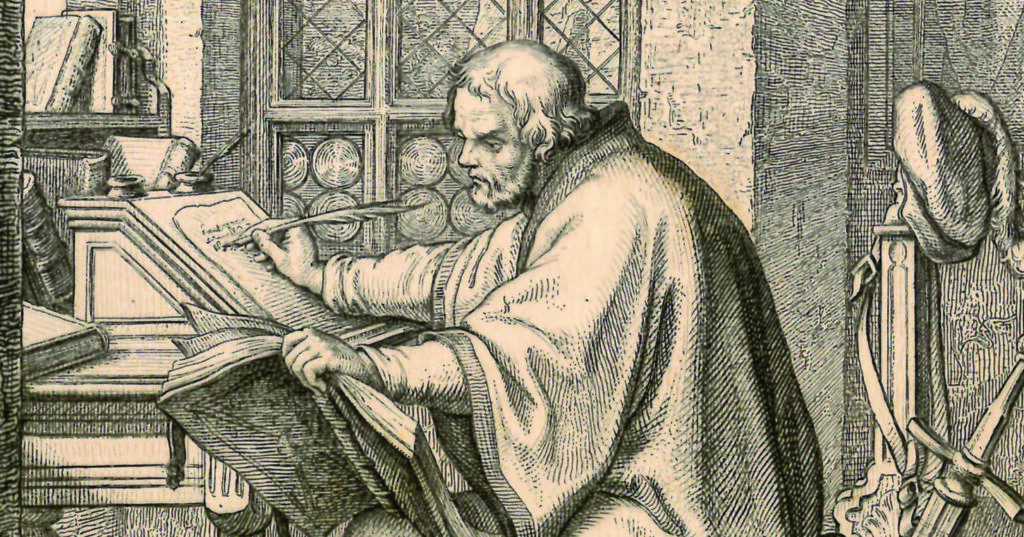by Matthew C. Harrison
Dear Friends in Christ,
This month I’ll give way to a much better writer and preacher, Martin Luther. In 1520, he wrote his masterful tract, “The Freedom of a Christian.” It’s one of the fundamental writings from the reformer’s pen. In the following passage, Luther explains why a Christian loves and serves his neighbor in the vocations of father, mother, son, daughter, worker, employer and so on. Christ serves us, giving us the gift of free forgiveness and righteousness, without our works. This changes our lives and alters our attitudes toward all those in our lives. Christ humbled Himself and became a servant. We do likewise, freely, compelled by this Gospel.
Ask your pastor if you can borrow volume 31 of Luther’s Works (pp. 343–77) and read the pamphlet for yourself. You won’t regret it.
— Pastor Matthew C. Harrison
[A Christian] ought to think: “Although I am an unworthy and condemned man, my God has given me in Christ all the riches of righteousness and salvation without any merit on my part, out of pure, free mercy, so that from now on I need nothing except faith which believes that this is true. Why should I not therefore freely, joyfully, with all my heart, and with an eager will do all things which I know are pleasing and acceptable to such a Father who has overwhelmed me with his inestimable riches? I will therefore give myself as a Christ to my neighbor, just as Christ offered himself to me; I will do nothing in this life except what I see is necessary, profitable, and salutary to my neighbor, since through faith I have an abundance of all good things in Christ.”
Behold, from faith thus flow forth love and joy in the Lord, and from love a joyful, willing, and free mind that serves one’s neighbor willingly and takes no account of gratitude or ingratitude, of praise or blame, of gain or loss. For a man does not serve that he may put men under obligations. He does not distinguish between friends and enemies or anticipate their thankfulness or unthankfulness, but he most freely and most willingly spends himself and all that he has, whether he wastes all on the thankless or whether he gains a reward. As his Father does, distributing all things to all men richly and freely, making “his sun rise on the evil and on the good” [Matt. 5:45], so also the son does all things and suffers all things with that freely bestowing joy which is his delight when through Christ he sees it in God, the dispenser of such great benefits.
Therefore, if we recognize the great and precious things which are given us, as Paul says [Rom. 5:5], our hearts will be filled by the Holy Spirit with the love which makes us free, joyful, almighty workers and conquerors over all tribulations, servants of our neighbors, and yet lords of all. For those who do not recognize the gifts bestowed upon them through Christ, however, Christ has been born in vain; they go their way with their works and shall never come to taste or feel those things. Just as our neighbor is in need and lacks that in which we abound, so we were in need before God and lacked his mercy. Hence, as our heavenly Father has in Christ freely come to our aid, we also ought freely to help our neighbor through our body and its works, and each one should become as it were a Christ to the other that we may be Christs to one another and Christ may be the same in all, that is, that we may be truly Christians.
Who then can comprehend the riches and the glory of the Christian life? It can do all things and has all things and lacks nothing. It is lord over sin, death, and hell, and yet at the same time it serves, ministers to, and benefits all men. But alas in our day this life is unknown throughout the world; it is neither preached about nor sought after; we are altogether ignorant of our own name and do not know why we are Christians or bear the name of Christians. Surely we are named after Christ, not because he is absent from us, but because he dwells in us, that is, because we believe in him and are Christs one to another and do to our neighbors as Christ does to us. But in our day we are taught by the doctrine of men to seek nothing but merits, rewards, and the things that are ours; of Christ we have made only a taskmaster far harsher than Moses.
We have a pre-eminent example of such a faith in the blessed Virgin. As is written in Luke 2[:22], she was purified according to the law of Moses according to the custom of all women, although she was not bound by that law and did not need to be purified. Out of free and willing love, however, she submitted to the law like other women that she might not offend or despise them. She was not justified by this work, but being righteous she did it freely and willingly. So also our works should be done, not that we may be justified by them, since, being justified beforehand by faith, we ought to do all things freely and joyfully for the sake of others.
Martin Luther, Luther’s Works, Vol. 31: Career of the Reformer I, ed. Harold J. Grimm and Helmut T. Lehmann, vol. 31 (Philadelphia: Fortress Press, 1957), 367–68.






Perhaps the Christian disposition could be said to resemble that of a wayward human being who was pulled from the gutter, pardoned for his crimes, cleaned up, trained up, and hired to do honest, fulfilling work with his new talents for the benefit of other people. I occasionally read stories of men who have actually gone through that, and their expressed gratitude comes from being saved in several ways.
The Christian is a disciple who aspires to fulfill, in this life, the purposes for which God has shown mercy and still imparts his grace and his gifts. For to be saved from a wayward existence leading to destruction is to be saved into a new life as God’s own instruments, doing what glorifies God, blesses others and brings real joy.
— “[Christ] died for all, that those who live might no longer live for themselves but for him who for their sake died and was raised.” (2 Cor. 5:15 ESV)
— We are “created in Christ Jesus for good works, which God prepared beforehand, that we should walk in them.” (Eph. 2:10 ESV)
— “[Christ] gave himself for us to redeem us from all lawlessness and to purify for himself a people for his own possession who are zealous for good works.” (Titus 2:14 ESV)
— “But you are a chosen race … that you may proclaim the excellencies of him who brought you out of darkness and into his marvelous light.” (1 Peter 2:9 ESV)
— Jesus said, “If you know these things, blessed are you if you do them.” (John 13:17 ESV)
— Jesus said, “By this my Father is glorified, that you bear much fruit and so prove to be my disciples. […] These things I have spoken to you, that my joy may be in you, and that your joy may be full.” (John 15:8, 11 ESV)